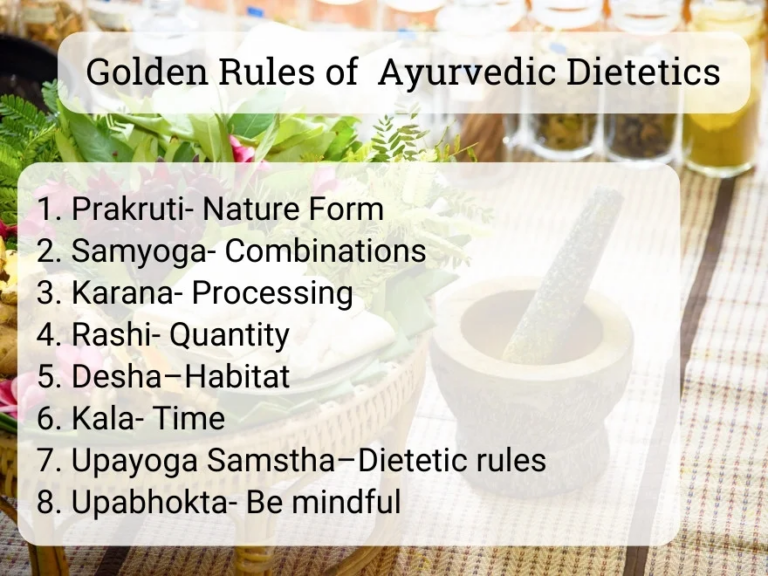
Ayurveda, where wellness is more than just a meal. I have included Ayurvedic practices in my life and it has shown me how this ancient knowledge can improve one’s health and happiness. So then how can the golden rule of balance change everything we eat but also the way we live it?
What is the golden rule in Ayurveda?
The golden rule of Ayurveda is to maintain balance in the body, mind, and spirit by aligning with one’s natural constitution or dosha. This balance is achieved through diet, lifestyle, and environmental harmony, promoting health, longevity, and well-being by preventing disease and enhancing vitality.
Ayurveda teaches that three doshas, Vata, Pitta, and Kapha have to be in balance for health. In essence, this includes physical practices like diet and physical activity, mental practices like meditation, and spiritual practices like mindfulness. The same principle is applied in the balance of daily routines and changes seasonally by adapting practices to maintain balance.
Knowing one’s unique constitution and respecting it can build a way of life that strengthens natural strengths and corrects weaknesses, offering improved vitality and prevention from illness by getting involved in proactive and personalized health care.
How does Ayurveda balance the body?
Ayurveda achieves balance by aligning an individual’s lifestyle with their dosha. This includes tailored diets, exercise, meditation, and herbal remedies. Understanding and maintaining balance among the three doshas Vata, Pitta, and Kapha ensures optimal health and prevents illness by addressing both physical and mental well-being.
Balancing the energies of the body in Ayurveda is done through a personalized approach. Dietary choices will be made according to dosha characteristics, where foods of the cooling type will be given to Pitta, and those of the grounding type to Vata.
Whereas Kapha gets exercises that are very intense, Vata would focus on activities that have a sedating effect. Herbs like Ashwagandha and Triphala not only support balance by rectifying specific dosha needs but meditation and yoga carry it through to the mental and emotional levels.
There is, therefore, an awareness of the lifestyle practices regularly re-evaluated and adjusted to keep them in balance. With this kind of health practice, the body’s natural healing processes will be allowed to operate efficiently, thus leading to long-term wellness and vigor.

What are the three doshas in Ayurveda?
The three doshas in Ayurveda are Vata, Pitta, and Kapha, representing different body and personality types. Vata governs movement, Pitta controls metabolism, and Kapha manages structure and lubrication.
The dosha composition varies in each individual and defines his or her physical characteristics and health needs accordingly. Vata combines with space and air to administer movement and communication, influencing creativity and flexibility but causing anxiety and unpredictable digestion when out of balance. Pitta combines fire and water, controlling digestion and metabolism, giving energy and intellect but leading to anger and inflammation if excessive.
Kapha combines earth and water, providing structure and stability, and gives calmness and vigor but leads to lethargy and excess weight when unbalanced. Balancing these doshas is important in tailoring the lifestyle and food habits so one has a balanced constitution, avoiding health problems through proper care and precaution.
How do you balance your doshas according to Ayurveda?
According to ayurveda, you can balance your dosha by adapting diet, exercise, and lifestyle to your unique constitution. Eating foods that counteract dosha imbalances, engaging in appropriate physical activities, and maintaining a daily routine aligned with nature’s rhythms are essential. Mindfulness practices, like yoga and meditation, also promote balance.
The balancing of doshas in Ayurveda incorporates personal adjustments according to one’s constitution. For Vata, warm, grounding food, and regular routines counteract the irregularity. For Pitta, cooling foods and stress management techniques work well. Light, stimulating activities and diets work well for Kapha.
For physical balance, regular exercise would be attuned to the dosha type. Mindfulness practices yoga and meditation stabilize the mind for harmony. Seasonal adjustments, with daily routines, add further refinement to one’s balance. This provides for dynamic adjustment amidst continuous awareness of both the internal and external factors, thus securing health and vitality in the long term.

Why is it important to understand your dosha in Ayurveda?
Understanding your dosha is crucial for personalized health recommendations in Ayurveda. It helps tailor diet, exercise, and lifestyle choices to enhance well-being and prevent disease. By knowing your dosha, you can identify imbalances, make informed health decisions, and maintain harmony in body and mind.
The dominant dosha educates one on natural tendencies and health predispositions, guiding lifestyle choices. Thus, one becomes inclined to identify imbalances at an early stage and can make proactive changes in diet, routine, and behavior.
Personalized dietary advice allows the intake of nutrients that will be compatible with your constitution. Specific exercises are done to maintain physical harmony. One will also have mindfulness practices aligned to his or her dosha needs for mental well-being.
Knowing your dosha will help you make knowledgeable choices that go hand in glove with your natural powers while curbing them at the negatives to ensure that you attain perfect health, longevity, and fulfillment out of life by living a balanced life.
What role does diet play in Ayurveda?
Diet plays an important role in Ayurveda, healthy diet emphasizes the interconnectedness of mind and body, recognizing that mental and emotional states impact physical health. Practices like meditation, yoga, and pranayama promote mental clarity and stress reduction.
Balancing doshas through lifestyle and diet supports mental well-being, fostering harmony and holistic health. Diet has a therapeutic role in Ayurveda and is considered to be the keystone of health.
Foods are thus selected for their energetic qualities and the effects they have on the doshas. For example, cooling foods balance Pitta, while Vata is nourished by warming foods. Eating with the seasons helps a person remain in harmony with the natural cycles of nature and keeps digestion and immunity in good order.
Spices used are turmeric, used for medicinal purposes such as digestion and detoxification, and ginger for digestive support. Mindful eating practices bring about awareness and may prevent overeating. Personalized dietary advice based on dosha ensures optimum nutrition, energy, and balance for wellness in the long run.
Wrapping Up!
Adopting Ayurveda is like fine-tuning an instrument. The greater the harmony, the more beautiful the music. Whether you’re a beginner or want to deepen your practice, remember that Ayurveda is not only about living longer; it’s about living more fully, with each moment aligned and every breath intentional.

